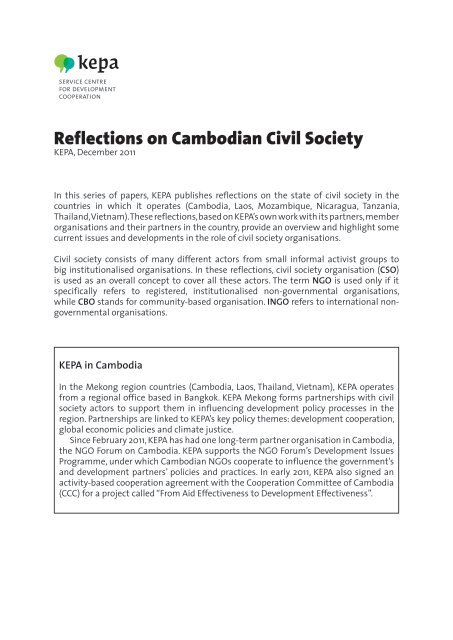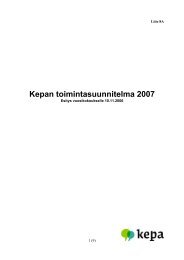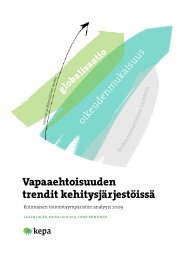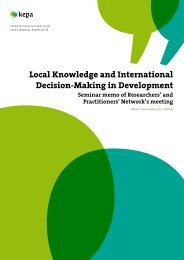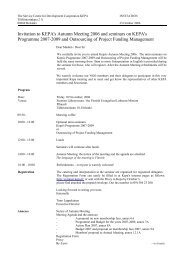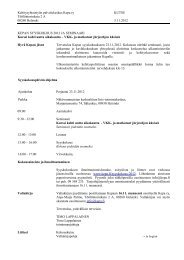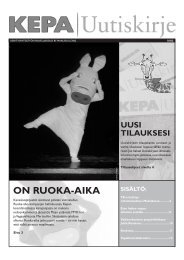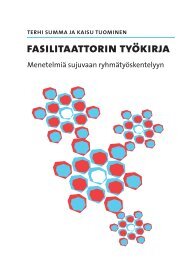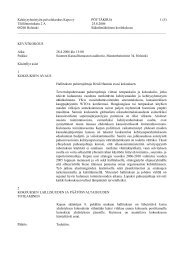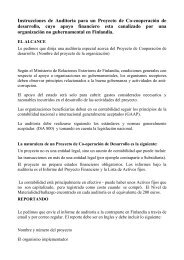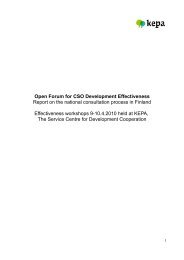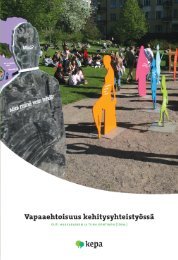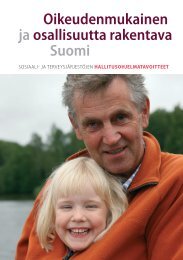Reflections on Cambodian Civil Society - Kepa
Reflections on Cambodian Civil Society - Kepa
Reflections on Cambodian Civil Society - Kepa
You also want an ePaper? Increase the reach of your titles
YUMPU automatically turns print PDFs into web optimized ePapers that Google loves.
service centre<br />
for development<br />
cooperati<strong>on</strong><br />
<str<strong>on</strong>g>Reflecti<strong>on</strong>s</str<strong>on</strong>g> <strong>on</strong> <strong>Cambodian</strong> <strong>Civil</strong> <strong>Society</strong><br />
KEPA, December 2011<br />
In this series of papers, KEPA publishes reflecti<strong>on</strong>s <strong>on</strong> the state of civil society in the<br />
countries in which it operates (Cambodia, Laos, Mozambique, Nicaragua, Tanzania,<br />
Thailand, Vietnam). These reflecti<strong>on</strong>s, based <strong>on</strong> KEPA’s own work with its partners, member<br />
organisati<strong>on</strong>s and their partners in the country, provide an overview and highlight some<br />
current issues and developments in the role of civil society organisati<strong>on</strong>s.<br />
<strong>Civil</strong> society c<strong>on</strong>sists of many different actors from small informal activist groups to<br />
big instituti<strong>on</strong>alised organisati<strong>on</strong>s. In these reflecti<strong>on</strong>s, civil society organisati<strong>on</strong> (CSO)<br />
is used as an overall c<strong>on</strong>cept to cover all these actors. The term NGO is used <strong>on</strong>ly if it<br />
specifically refers to registered, instituti<strong>on</strong>alised n<strong>on</strong>-governmental organisati<strong>on</strong>s,<br />
while CBO stands for community-based organisati<strong>on</strong>. INGO refers to internati<strong>on</strong>al n<strong>on</strong>governmental<br />
organisati<strong>on</strong>s.<br />
KEPA in Cambodia<br />
In the Mek<strong>on</strong>g regi<strong>on</strong> countries (Cambodia, Laos, Thailand, Vietnam), KEPA operates<br />
from a regi<strong>on</strong>al office based in Bangkok. KEPA Mek<strong>on</strong>g forms partnerships with civil<br />
society actors to support them in influencing development policy processes in the<br />
regi<strong>on</strong>. Partnerships are linked to KEPA’s key policy themes: development cooperati<strong>on</strong>,<br />
global ec<strong>on</strong>omic policies and climate justice.<br />
Since February 2011, KEPA has had <strong>on</strong>e l<strong>on</strong>g-term partner organisati<strong>on</strong> in Cambodia,<br />
the NGO Forum <strong>on</strong> Cambodia. KEPA supports the NGO Forum’s Development Issues<br />
Programme, under which <strong>Cambodian</strong> NGOs cooperate to influence the government’s<br />
and development partners’ policies and practices. In early 2011, KEPA also signed an<br />
activity-based cooperati<strong>on</strong> agreement with the Cooperati<strong>on</strong> Committee of Cambodia<br />
(CCC) for a project called “From Aid Effectiveness to Development Effectiveness”.
Historical background<br />
Formal CSOs are a relatively new<br />
phenomen<strong>on</strong> in Cambodia. Only in<br />
the 1990s, with the work of UNTAC<br />
(United Nati<strong>on</strong>s Transiti<strong>on</strong>al Authority in<br />
Cambodia), foreign development actors<br />
took some initiatives to organise civil<br />
society in the country. As a result, local<br />
CSOs started to emerge supported by<br />
development actors. With flexible CSO<br />
rules and regulati<strong>on</strong>s al<strong>on</strong>g with easy<br />
availability of external funds, Cambodia<br />
has seen a rapid growth of the CSO<br />
community.<br />
Many CSOs in Cambodia support and<br />
even replace the state authorities’ work<br />
<strong>on</strong> service delivery in rural development,<br />
educati<strong>on</strong>, health, and social development<br />
sectors. There are also CSOs that are<br />
involved in capacity building, informati<strong>on</strong><br />
sharing, policy advocacy, and the<br />
m<strong>on</strong>itoring and evaluati<strong>on</strong> of large-scale<br />
development projects. In additi<strong>on</strong>, a<br />
number of CSOs work <strong>on</strong> natural resource<br />
management and land issues. A couple<br />
of umbrella organisati<strong>on</strong>s coordinate the<br />
work of CSOs. In recent years, CBOS have<br />
also emerged.<br />
Main actors in <strong>Cambodian</strong> civil<br />
society<br />
At the end of 2010, there were 2,675<br />
registered NGOs in Cambodia,<br />
approximately <strong>on</strong>e thousand of which<br />
are active. Of those, 316 are internati<strong>on</strong>al<br />
NGOs. CSOs also include many different<br />
types of unregistered CBOs. Working with<br />
or through CBOs is comm<strong>on</strong> practice for<br />
many NGOs, but this engagement is less<br />
collaborative and more for the purposes<br />
of service delivery. According to the NGO<br />
Forum <strong>on</strong> Cambodia, CSOs have five key<br />
roles: service delivery, dialogue facilitati<strong>on</strong>,<br />
social c<strong>on</strong>science (e.g. promoting human<br />
rights), advocacy, and providing policy<br />
advice.<br />
There are a few key umbrella<br />
2<br />
organisati<strong>on</strong>s in Cambodia. The<br />
Cooperati<strong>on</strong> Committee of Cambodia<br />
(CCC) is a membership organisati<strong>on</strong>,<br />
whose main role is to act as the voice<br />
of CSOs to the government and d<strong>on</strong>or<br />
community. The NGO Forum <strong>on</strong> Cambodia<br />
is a coordinating organisati<strong>on</strong> for some<br />
100 CSOs working <strong>on</strong> development,<br />
envir<strong>on</strong>mental, and livelihoods issues.<br />
MEDiCAM is a membership organisati<strong>on</strong><br />
for some 115 CSOs active in Cambodia’s<br />
health sector. The <strong>Cambodian</strong> Human<br />
Rights Acti<strong>on</strong> Committee (CHRAC) is a<br />
coaliti<strong>on</strong> of 21 CSOs, which works towards<br />
the promoti<strong>on</strong> of and respect for human<br />
rights, democracy, and the rule of law in<br />
Cambodia.<br />
In August 2009, a new network of local<br />
and internati<strong>on</strong>al CSOs working <strong>on</strong> climate<br />
change was born. The Nati<strong>on</strong>al Climate<br />
Change Network (NCCN) comprises around<br />
45 organisati<strong>on</strong>s. The network’s main<br />
objectives are to improve coordinati<strong>on</strong><br />
between d<strong>on</strong>ors, civil society, researchers,<br />
and government representatives, and to<br />
facilitate informati<strong>on</strong> sharing and capacity<br />
building am<strong>on</strong>g network members. Despite<br />
its success in bringing together different<br />
groups and having participated in the<br />
United Nati<strong>on</strong>s climate change c<strong>on</strong>ference<br />
in Copenhagen, the network still mostly acts<br />
as a channel for sharing informati<strong>on</strong> am<strong>on</strong>g<br />
members, lacking a comm<strong>on</strong> positi<strong>on</strong> <strong>on</strong><br />
climate policy. In 2010, Oxfam America<br />
commissi<strong>on</strong>ed a c<strong>on</strong>sultant to develop<br />
methods to instituti<strong>on</strong>alize the network.<br />
There are no networks or CSOs working<br />
specifically <strong>on</strong> internati<strong>on</strong>al trade issues.<br />
The NGO Forum used to have a Trade<br />
and Ec<strong>on</strong>omic Development programme<br />
in 2004-2008, but the programme was<br />
disc<strong>on</strong>tinued due to the passivity of<br />
member organisati<strong>on</strong>s <strong>on</strong> the issue. Trade<br />
uni<strong>on</strong>s have been active in demanding<br />
better trade deals and work c<strong>on</strong>diti<strong>on</strong>s,<br />
but their situati<strong>on</strong> is challenging as a<br />
c<strong>on</strong>siderable number of labour activists<br />
were laid off during the recent global<br />
ec<strong>on</strong>omic downturn.
In the field of development financing,<br />
the leading CSO umbrellas (CCC, NGO<br />
Forum and MEDiCam) have been actively<br />
working <strong>on</strong> civil society participati<strong>on</strong> in<br />
the joint government-d<strong>on</strong>or meetings.<br />
They coordinated the preparati<strong>on</strong> and<br />
publicati<strong>on</strong> of NGO Positi<strong>on</strong> Papers <strong>on</strong><br />
Cambodia’s Development in 2009-2010<br />
as well as the NGO Statement <strong>on</strong> Priority<br />
Issues to the 3rd Cambodia Development<br />
Cooperati<strong>on</strong> Forum, organised in June<br />
2010. The same umbrella organisati<strong>on</strong>s<br />
have also helped CSOs to voice their<br />
c<strong>on</strong>cerns related to the development of the<br />
five-year Nati<strong>on</strong>al Strategic Development<br />
Plan (NSDP) for 2009-2013. In order to<br />
improve and develop the role of CSOs in<br />
aid effectiveness, CCC held five regi<strong>on</strong>al<br />
training workshops and several multistakeholder<br />
dialogues between November<br />
2009 and November 2010.<br />
Government–civil society<br />
relati<strong>on</strong>s<br />
No legal framework governing the work<br />
of CSOs exists today. The C<strong>on</strong>stituti<strong>on</strong><br />
of 1993, however, recognizes civil<br />
organisati<strong>on</strong>s, but there is a lack of clarity<br />
about CSO registrati<strong>on</strong> processes. Some<br />
register through the Council of Ministers,<br />
some with line ministries or provincial<br />
authorities.<br />
The NGO law, known formally as<br />
the Law <strong>on</strong> Associati<strong>on</strong>s and N<strong>on</strong>-<br />
Governmental Organisati<strong>on</strong>s, was first<br />
proposed in 1997 and revived in late 2008<br />
by the Prime Minister Hun Sen. The first<br />
draft of the NGO law was released by<br />
the Ministry of the Interior <strong>on</strong> December<br />
2010, and the sec<strong>on</strong>d draft in March 2011.<br />
The proposed legislati<strong>on</strong> is perceived by<br />
many as an attempt to limit the space<br />
for an independent civil society. CSOs<br />
feel that the law’s new requirements for<br />
registrati<strong>on</strong> and reporting are excessive,<br />
prohibitively burdensome, and violate the<br />
freedom of associati<strong>on</strong>. The registrati<strong>on</strong><br />
requirements will be especially difficult to<br />
3<br />
meet for smaller organisati<strong>on</strong>s and those<br />
located in rural areas (e.g. CBOs), as they<br />
lack the capacity to fill in complicated forms<br />
and reach administrative centres to deliver<br />
them. There is no clear or transparent<br />
process for evaluating applicati<strong>on</strong>s, and a<br />
limited right to appeal was removed from<br />
the first draft. This might make it especially<br />
difficult for organisati<strong>on</strong>s deemed critical<br />
of the government to operate freely.<br />
The CSOs, led by the CCC, the NGO Forum<br />
and MEDiCam, met with government<br />
representatives <strong>on</strong> January 10th, January<br />
21st, February 23rd, and March 29th, 2011 to<br />
discuss points of ambiguity and c<strong>on</strong>cern. In<br />
the initial meeting, many recommendati<strong>on</strong>s<br />
were provisi<strong>on</strong>ally accepted. However, in a<br />
follow-up meeting <strong>on</strong> March 29th, where<br />
representatives from both the Ministry of<br />
Interior and Ministry of Foreign Affairs and<br />
Internati<strong>on</strong>al Cooperati<strong>on</strong> were present,<br />
the government was less willing to discuss<br />
and amend the law in any substantive<br />
manner.<br />
In April, as the draft law was being<br />
forwarded to the Council of Ministers, CSOs<br />
both in Cambodia and abroad sent separate<br />
petiti<strong>on</strong>s to the <strong>Cambodian</strong> government<br />
urging a new drafting process. One petiti<strong>on</strong><br />
was sent by 62 INGOs working in Cambodia,<br />
another by 8 internati<strong>on</strong>al human rights<br />
groups, and the third by 315 <strong>Cambodian</strong><br />
CSOs. Several d<strong>on</strong>or governments also asked<br />
the <strong>Cambodian</strong> government not to pass the<br />
current NGO Law proposal.<br />
Current issues and latest<br />
developments<br />
Land grabbing has become a tragic<br />
epidemic in Cambodia, as poor and<br />
vulnerable people have lost their homes<br />
and livelihoods. Forced evicti<strong>on</strong>s are<br />
occurring in the c<strong>on</strong>text of rapid foreign<br />
investment, skyrocketing land prices,<br />
endemic corrupti<strong>on</strong> and an absence<br />
of secure land tenure for low-income<br />
households. According to the local<br />
CSO Sahmakum Teang Tnaut, at least
120,000 people have been displaced since<br />
1990 in the capital Phnom Penh al<strong>on</strong>e.<br />
Nati<strong>on</strong>wide figures are hard to ascertain,<br />
but c<strong>on</strong>servative estimates suggest that<br />
at least 150,000 <strong>Cambodian</strong>s currently<br />
live under the imminent threat of forced<br />
evicti<strong>on</strong>, and over 250,000 <strong>Cambodian</strong>s<br />
have been affected by land disputes.<br />
<strong>Cambodian</strong> CSOs have been working<br />
<strong>on</strong> the land issue for years, but there is no<br />
sign that the authorities are moving to<br />
solve the problem. The resp<strong>on</strong>se from the<br />
government is typically a blanket denial<br />
that any problem exists. However, during<br />
the past few years, several people have<br />
died and hundreds have been injured as<br />
the police and the army have dispersed<br />
local dem<strong>on</strong>strati<strong>on</strong>s against land<br />
c<strong>on</strong>cessi<strong>on</strong>s.<br />
In August 2011, the World Bank<br />
announced that it will not give loans to<br />
Cambodia until it has solved the problem<br />
of forced evicti<strong>on</strong>s in Phnom Penh. Such<br />
threats may not be effective, as <strong>Cambodian</strong><br />
tyco<strong>on</strong>s and their friends in government<br />
are profiting by selling or leasing farmland<br />
and prime real estate to foreign firms.<br />
Most of these firms are Chinese, and China<br />
is offering more development m<strong>on</strong>ey<br />
than Western d<strong>on</strong>ors, with fewer strings<br />
attached.<br />
China is Cambodia’s biggest source of<br />
foreign direct investment (FDI), and in the<br />
first seven m<strong>on</strong>ths of 2011 it pledged $8<br />
billi<strong>on</strong> for 360 projects, the same amount<br />
it invested in the whole of Southeast Asia<br />
in 2008.<br />
According to the NGO Forum <strong>on</strong><br />
Cambodia, the envir<strong>on</strong>mental impact<br />
assessment processes of Chinese<br />
companies are not open to the public.<br />
China also often requires high interest<br />
rates and provides loans for short terms.<br />
<strong>Cambodian</strong> civil society is also worried<br />
that Chinese companies are increasingly<br />
involved in land-grabbing, logging, and<br />
the exploitati<strong>on</strong> of mineral resources<br />
in Cambodia’s Northeast, affecting the<br />
livelihoods of ethnic minorities.<br />
4<br />
Hydropower dams have been<br />
another big issue discussed am<strong>on</strong>g civil<br />
society actors in Cambodia. Despite the<br />
government’s announcement in 2010 that<br />
they would prioritize renewable energy<br />
in rural electrificati<strong>on</strong>, five hydropower<br />
dams have been approved since 2005,<br />
with numerous other large dams currently<br />
under feasibility study, including two huge<br />
dams <strong>on</strong> the Mek<strong>on</strong>g’s mainstream (the<br />
Sambor and Stung Treng dams). According<br />
to CSOs, these projects would have<br />
significant adverse impacts <strong>on</strong> Cambodia’s<br />
fisheries and forests, and cause large-scale<br />
displacement of communities.<br />
The American company Chevr<strong>on</strong><br />
discovered oil in Cambodia in 2005,<br />
and the country is expected to start oil<br />
producti<strong>on</strong> in 2012. Estimates for the oil<br />
revenues are about 1.7 billi<strong>on</strong> US dollars<br />
a year; the government’s yearly budget is<br />
$1.2 billi<strong>on</strong>.<br />
Understandably, <strong>Cambodian</strong> civil society<br />
fears the ‘resource curse’. According to<br />
the NGO Forum, there has been very little<br />
informati<strong>on</strong> about developments in the oil<br />
and mining sectors, and the government<br />
has not come up with a coherent plan<br />
for managing oil revenues. Cambodia<br />
has not joined the Extractive Industries<br />
Transparency Initiative. The country is at<br />
the bottom of Transparency Internati<strong>on</strong>al’s<br />
corrupti<strong>on</strong> index, as corrupti<strong>on</strong>, nepotism,<br />
and patr<strong>on</strong>age are comm<strong>on</strong> practice in<br />
managing nati<strong>on</strong>al assets under the Hun<br />
Sen administrati<strong>on</strong>.<br />
Funding for civil society actors<br />
In 2010, Western d<strong>on</strong>ors provided<br />
Cambodia with 1.1 billi<strong>on</strong> US dollars in aid,<br />
a major increase from the previous year’s<br />
950 milli<strong>on</strong> dollars. This happened despite<br />
the <strong>Cambodian</strong> government falling short<br />
of the standards the Western governments<br />
were pushing for. The main aid sectors<br />
were government and administrati<strong>on</strong>,<br />
health, transportati<strong>on</strong>, educati<strong>on</strong>, and<br />
rural development.
More than 103 milli<strong>on</strong> US dollars was<br />
distributed to <strong>Cambodian</strong> CSOs in 2009<br />
by internati<strong>on</strong>al NGOs, foundati<strong>on</strong>s<br />
and d<strong>on</strong>or governments. This is equal<br />
to approximately ten per cent of official<br />
development assistance, but <strong>on</strong>ly about<br />
20 per cent of the aid was delivered at the<br />
local (sub-nati<strong>on</strong>al) level. Most <strong>Cambodian</strong><br />
CSOs work in the areas of health,<br />
community and social welfare, educati<strong>on</strong>,<br />
agriculture and rural development, and<br />
governance.<br />
As the <strong>Cambodian</strong> CSO sector is still<br />
dominated by internati<strong>on</strong>al NGOs, most<br />
local CSOs lack grassroots ties and are<br />
not embedded in the local society. The<br />
relati<strong>on</strong>ship between internati<strong>on</strong>al<br />
and local CSOs is, in most cases,<br />
hierarchical. The dependency of local<br />
CSOs <strong>on</strong> internati<strong>on</strong>al d<strong>on</strong>ors makes them<br />
financially unsustainable.<br />
5<br />
Role of INGOs<br />
There are over 300 INGOs present in<br />
Cambodia. Many of them have their own<br />
projects in the country and also provide<br />
funding to local CSOs. In the past few years,<br />
many of the CSOs that were originally set<br />
up by foreigners have transiti<strong>on</strong>ed into<br />
<strong>Cambodian</strong> management. However, it is<br />
generally accepted that internati<strong>on</strong>al CSOs<br />
are very influential in setting agendas<br />
and providing resources for development<br />
projects in Cambodia, since local CSOs<br />
have to depend heavily <strong>on</strong> funding from<br />
internati<strong>on</strong>al d<strong>on</strong>ors.<br />
It is difficult for Northern CSOs to reach<br />
local Khmer-speaking CSOs, so working<br />
with nati<strong>on</strong>al CSOs to strengthen and<br />
reach local networks could be <strong>on</strong>e strategy<br />
to create linkages between local and<br />
nati<strong>on</strong>al civil society movements.
Finnish CSOs in Cambodia<br />
Name of Finnish CSO Name(s) of<br />
<strong>Cambodian</strong> partners<br />
FIDA Internati<strong>on</strong>al Cambodia Global<br />
Acti<strong>on</strong><br />
Frikyrklig Samverkan United Methodist<br />
Church in Cambodia<br />
Finn Church Aid Lutheran World<br />
Federati<strong>on</strong><br />
The Finnish<br />
Evangelical Lutheran<br />
Missi<strong>on</strong><br />
Internati<strong>on</strong>al<br />
Cooperati<strong>on</strong><br />
Cambodia, Wholistic<br />
Development<br />
Organisati<strong>on</strong><br />
6<br />
Number of<br />
projects in<br />
Cambodia<br />
Sector of work<br />
1 Multisectoral for social<br />
services<br />
1 Agriculture<br />
development<br />
2 Rural development,<br />
gender equality<br />
6 Women’s and<br />
children’s rights,<br />
educati<strong>on</strong>,<br />
strengthening<br />
civil society, ethnic<br />
minorities<br />
The Finnish Red Cross <strong>Cambodian</strong> Red Cross 1 Health educati<strong>on</strong><br />
The Finnish<br />
Associati<strong>on</strong> for the<br />
Deaf<br />
Operati<strong>on</strong> Day’s Work<br />
Finland (Taksvärkki)<br />
ABILIS Different<br />
disabled people’s<br />
organisati<strong>on</strong>s<br />
The Finnish NGO<br />
Foundati<strong>on</strong> for<br />
Human Rights KIOS<br />
Trade Uni<strong>on</strong> Solidarity<br />
Centre of Finland<br />
SASK<br />
Maryknoll Cambodia 1 Democratic<br />
participati<strong>on</strong><br />
LICADHO 1 Child labour<br />
Protecti<strong>on</strong> of Juvenile<br />
Justice<br />
<strong>Cambodian</strong><br />
C<strong>on</strong>structi<strong>on</strong> Worker<br />
Trade Uni<strong>on</strong>s<br />
Federati<strong>on</strong>,<br />
<strong>Cambodian</strong><br />
Federati<strong>on</strong> of Building<br />
and Wood Workers<br />
10 Disabled people’s<br />
rights and participati<strong>on</strong><br />
1 Human rights<br />
1 Labour uni<strong>on</strong>s


